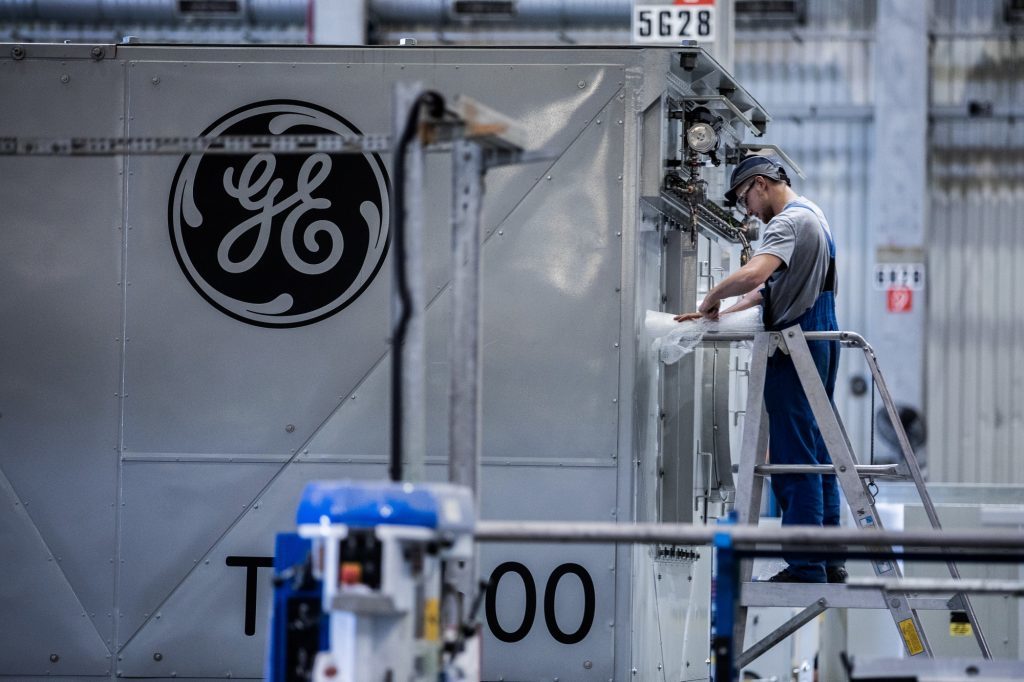
General Electric Co. agreed to sell its industrial gas-engine business to Advent International for $3.25 billion, bolstering Chief Executive Officer John Flannery’s plan to shed assets and reshape the beleaguered manufacturer.
The private-equity firm will acquire GE’s Jenbacher and Waukesha engine brands and manufacturing sites in Austria, the U.S. and Canada, the companies said in a statement Monday. The deal is expected to close in the fourth quarter.
The sale of Distributed Power furthers Flannery’s pledge to narrow GE’s focus as he seeks to stem one of the deepest slides in the company’s 126-year history. The CEO, who’s also revamping the leadership and cutting costs, agreed last month to unload GE’s locomotive division as part of an effort to sell $20 billion of assets.
The transaction “checks the box on another divestiture,” Deane Dray, an analyst with RBC Capital Markets, said in a note. “Distributed Power was operated mostly as a stand-alone business within the GE Power portfolio, so we do not foresee any significant dis-synergies or complications with separating it in a sale.”
GE fell 1.7 percent to $12.83 at 11:32 a.m. in New York. The shares dropped 25 percent this year through June 22, following a 45 percent decline in 2017 — a slump that contributed to GE’s removal from the Dow Jones Industrial Average after more than 100 years in the blue-chip index.
Distributed Power, part of the GE division that also builds gas turbines and electrical equipment, produces heavy-duty engines that generate power and heat for industrial facilities. The business, which has about 3,000 employees, posted sales of $1.3 billion last year.
Microgrid Backbone
The on-site turbines also are used on college campuses as a way to keep buildings running when the grid goes dark. Increasingly, small gas turbines are seen as the backbone of microgrids that are reshaping the way communities get power because they can back up supplies from solar panels or battery systems.
“We like the space because we see a couple of megatrends, namely decentralization, decarbonization and gas replacing diesel,’’ Advent managing partner Ranjan Sen said in an interview. While the buyout firm will explore additional acquisition opportunities to expand Distributed Power, the primary focus will be “to invest in product portfolio, distribution, digitalization and facilitate a fast transformation to a standalone business.’’
GE has owned Jenbacher, named for the Austrian town Jenbach, since 2003. Seven years later, the company added Waukesha, which takes its name from a city in Wisconsin, through the acquisition of Dresser.
Advent targets companies with the potential for operational and strategic improvement. The Boston-based firm, which recently invested in smartphone-parts maker Laird Plc and Walmart Inc.’s Brazilian unit, is focused on a handful of markets, including industrial, retail and financial services.
Other Bidders
The sale process drew interest from strategic and financial bidders, including Cummins Inc. and KKR & Co., Bloomberg previously reported.
Flannery, who succeeded Jeffrey Immelt at the top of GE last year, is selling extraneous businesses such as lighting while reshaping the company around key markets, including aviation and health care. He’s also weighing bigger changes, including possibly breaking GE into separate businesses.
GE, also based in Boston, agreed in May to an $11.1 billion deal to merge its century-old locomotive manufacturing business with Wabtec Corp. That came after GE in April sold a piece of its health-care unit for $1.05 billion.
Investors are keeping a close eye on GE’s portfolio changes in the hope that the proceeds can provide a buffer as the company grapples with debt and cash-flow challenges. GE has said it anticipates proceeds of $5 billion to $10 billion from asset sales this year, depending on the timing of deal closings.